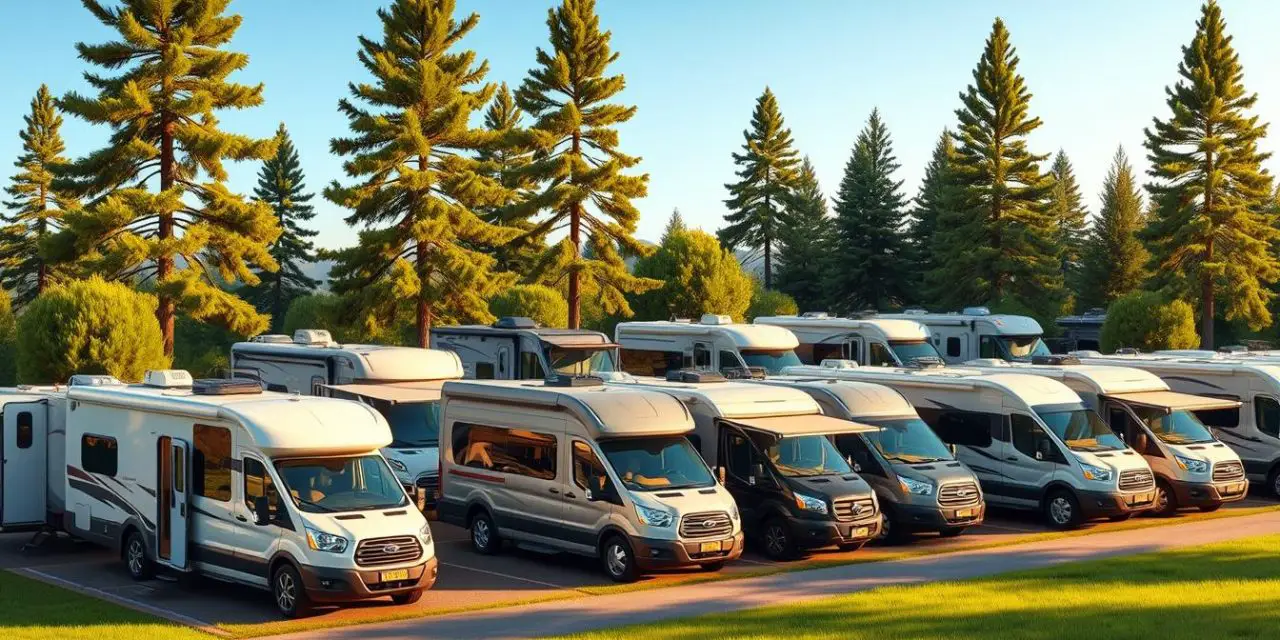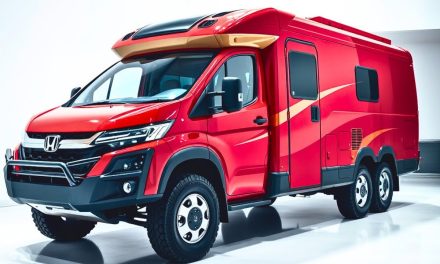The rise of van camping has led to an increase in enthusiasts seeking adventure on the open road. Many van owners are converting their vehicles into camper vans, seeking the freedom to explore new destinations.
As the popularity of van camping grows, so does the need to understand the policies of RV parks. While some RV parks welcome camper vans, others may have specific rules or restrictions in place.
For those considering a life on the road, it’s essential to know their options. This article will explore the possibilities for van campers and provide insight into the world of RV parks.
Key Takeaways
- Understanding RV park policies is crucial for van campers.
- Some RV parks welcome camper vans, while others have restrictions.
- Researching RV park rules can help van owners plan their trips.
- Van camping is becoming increasingly popular.
- Camper vans offer a unique way to experience the great outdoors.
The Growing Trend of Van Camping
As more people seek adventure and freedom, van camping has become an increasingly appealing option. This lifestyle offers the flexibility to travel, explore new places, and connect with nature without the constraints of traditional camping methods.
Would you like to save this article?
The Rise of Van Life Culture
The van life culture has grown significantly, driven by a community that values freedom, adventure, and simplicity. Social media platforms have played a crucial role in this rise, with countless stories and images of van life adventures inspiring others to take the leap. As a result, van camping has evolved from a niche interest to a mainstream phenomenon.
“The freedom to roam and the simplicity of life on the road is incredibly appealing to many.”
Differences Between Van Camping and Traditional RVing
Van camping differs from traditional RVing in several key ways. Firstly, vans are generally more maneuverable and easier to park than large RVs, making them ideal for exploring tight city streets or secluded natural areas. Additionally, vans typically require less maintenance and are more fuel-efficient than larger RVs. This makes van camping an attractive option for those who want to experience the freedom of life on the road without the logistical challenges of larger vehicles.
Overall, the growing trend of van camping reflects a broader desire for adventure, simplicity, and connection with nature. As this culture continues to evolve, it’s likely that we’ll see even more innovative approaches to van camping and van life.
Types of Vans Used for Camping
The world of van camping is diverse, with different types of vans offering unique advantages. Whether you’re a seasoned camper or just starting out, understanding the various options available can help you make an informed decision.
Class B Camper Vans
Class B camper vans, also known as camper vans, are built on a van chassis and provide a compact, all-in-one camping solution. They typically include sleeping quarters, kitchen facilities, and bathroom amenities. These vans are ideal for those who want a hassle-free camping experience without sacrificing comfort.
Converted Cargo Vans
Converted cargo vans offer a blank canvas for customization. Enthusiasts can convert these vans into mobile homes, tailoring the interior to their specific needs. This type of van is perfect for those who enjoy DIY projects and want a unique camping experience.
Passenger Van Conversions
Passenger van conversions involve transforming a standard passenger van into a camping vehicle. This can range from simple modifications to full-scale conversions. A key consideration for these conversions is whether to opt for DIY conversions or professional builds.
DIY Conversions vs. Professional Builds
The choice between DIY conversions and professional builds depends on your budget, skills, and preferences. While DIY conversions offer flexibility and cost savings, professional builds provide expertise and a warranty. Consider your needs and resources when deciding which route to take.
Can Vans Stay at RV Parks? The Short Answer
As the popularity of van camping grows, so does the need to understand RV park policies regarding van acceptance. The answer to whether vans can stay at RV parks is not a simple yes or no; it depends on various factors, including the type of van, its equipment, and the specific RV park’s rules.
General Acceptance Policies
Many RV parks do accept vans, but their policies can vary widely. Some parks may have specific sites designated for vans or smaller RVs, while others may not differentiate between types of vehicles. It’s essential to check with the RV park directly before making a reservation.
Common Restrictions for Vans
Some common restrictions for vans at RV parks include size limitations, requirements for self-contained systems (including water, electricity, and sewage capabilities), and limitations on the length of stay. Vans that are not fully self-contained or are too large may be rejected by some parks.
The Importance of Self-Contained Systems
Having a self-contained system is crucial for van campers, as it allows them to be more independent and flexible when traveling. RV parks often prefer or require self-contained vehicles because they put less strain on the park’s facilities. A self-contained van typically includes a water tank, a battery or generator, and a sewage holding tank, making it more likely to be accepted at RV parks.
Understanding these factors can help van owners prepare for their stay at RV parks and increase their chances of being accepted.
What RV Parks Look for in Vehicles
Understanding what RV parks look for in vehicles can help van owners prepare for a hassle-free camping experience. RV parks typically evaluate vehicles based on several key factors to ensure they can accommodate the vehicle’s needs and maintain a comfortable environment for all guests.
Self-Containment Requirements
One of the primary considerations is self-containment. RV parks often prefer or require vehicles to be self-contained, meaning they have their own water, sewage, and electrical systems. This capability allows van dwellers to stay without relying heavily on the park’s hookups.
Hookup Compatibility
Another factor is hookup compatibility. The ability of a van to connect to the RV park’s electrical, water, and sewage systems is crucial. Parks want to ensure that vehicles can utilize their facilities efficiently.
Length of Stay Considerations
The length of stay is also a consideration. Some RV parks have minimum or maximum stay requirements, which can affect whether they can accommodate vans.
Minimum Stay Requirements
For instance, some parks may have a minimum stay requirement of two nights or more. Van owners should be aware of these policies when planning their trip.
| Criteria | Typical Requirements |
|---|---|
| Self-Containment | Water, sewage, and electrical systems |
| Hookup Compatibility | Electrical, water, and sewage hookups |
| Length of Stay | Minimum or maximum nights |
Types of RV Parks and Their Van Policies
RV parks vary significantly in their amenities and their policies on van stays. This diversity means that van owners have a range of options when planning their trips, but it also requires them to research and understand the specific rules of the RV park they wish to visit.
Luxury RV Resorts
Luxury RV resorts typically offer high-end amenities such as swimming pools, fitness centers, and fine dining options. These resorts often have specific policies regarding van accommodations, with some welcoming vans of all sizes and others having restrictions. For instance, some luxury resorts may limit van sizes or require certain amenities like self-contained systems.
Standard RV Campgrounds
Standard RV campgrounds provide more basic amenities compared to luxury resorts but still offer essential services like water and electric hookups. These campgrounds generally have more lenient policies regarding vans, often accommodating a wide range of van sizes. However, it’s still important for van owners to check the specific campground’s rules.
Public Campgrounds with RV Facilities
Public campgrounds, including those in state and national parks, offer RV facilities that can accommodate vans. These campgrounds often have more straightforward policies, focusing on the availability of space and basic regulations.
State Park RV Campgrounds
State park RV campgrounds are a subset of public campgrounds that provide a natural and often serene environment for van campers. They usually have specific rules regarding the length of stay, generator usage, and waste disposal. Van owners should be prepared to follow these regulations to ensure a pleasant stay.
When planning to stay at an RV park with a van, it’s crucial to call ahead or check the park’s website to understand their van policies. This includes knowing about any size restrictions, required amenities, and additional fees. By doing so, van owners can ensure a smooth and enjoyable experience at the RV park.
- Research the RV park’s van policy before arrival.
- Understand the amenities offered and any restrictions.
- Be prepared to provide information about your van’s size and amenities.
Regional Differences in Van Acceptance
As van camping gains popularity, regional differences in RV park policies regarding van acceptance have become more pronounced. The diverse landscape and cultural preferences across the United States influence how RV parks accommodate vans.
West Coast RV Park Policies
The West Coast, known for its van life culture, tends to be more van-friendly. Many RV parks in California, Oregon, and Washington have adapted to the growing number of van campers by offering appropriate amenities and services. For instance, some parks provide designated van areas with necessary hookups, catering to the specific needs of van dwellers.
East Coast Considerations
In contrast, the East Coast presents a mixed bag. While some RV parks welcome vans, others may have stricter policies due to space constraints or local regulations. It’s essential for van campers to research and call ahead to confirm the policies of the RV parks they plan to visit.
Midwest and Southern States Approach
The Midwest and Southern states generally offer a more relaxed environment for van campers. RV parks in these regions often have more spacious sites and are more accommodating to vans of various sizes. This openness makes them ideal destinations for those exploring these areas in their vans.
Understanding these regional differences is crucial for van campers to plan their trips effectively and ensure a smooth experience at RV parks.
How to Prepare Your Van for an RV Park Stay
To make the most of your RV park stay, it’s essential to prepare your van with the right modifications and equipment. A well-prepared van not only enhances your camping experience but also ensures that you comply with RV park regulations.
Essential Modifications and Equipment
Investing in the right modifications and equipment is crucial for a comfortable and enjoyable RV park stay. Some essential items include a reliable water tank, a robust electrical system, and a functional waste management system.
- A portable water tank to store fresh water
- A solar panel or generator for power
- A composting toilet or a portable toilet with waste tanks
Hookup Adaptors and Extensions
Having the right hookup adaptors and extensions can make a significant difference in your RV park experience. Ensure you have adaptors for different types of electrical hookups and consider investing in a water hose with the appropriate fittings.
Documentation You May Need
Some RV parks may require specific documentation, such as proof of insurance, vehicle registration, or certification of your van’s self-contained systems. It’s a good idea to have these documents readily available.
| Document | Description | Importance Level |
|---|---|---|
| Proof of Insurance | Insurance coverage for your van | High |
| Vehicle Registration | Registration documents for your van | High |
| Certification of Self-Contained Systems | Certification for your van’s waste and water systems | Medium |
Booking Tips for Van Campers
Booking an RV park spot as a van camper requires some insider knowledge to avoid potential pitfalls. Understanding the nuances of RV park reservations can make a significant difference in your camping experience.
Calling Ahead: What to Ask
One of the most crucial steps for van campers is calling ahead to confirm that the RV park can accommodate your vehicle. Here are some key questions to ask:
- Are vans allowed, and are there any specific restrictions?
- What are the park’s policies regarding self-contained systems and hookups?
- Are there any additional fees for van campers?
Online Booking Considerations
When booking online, it’s essential to check the RV park’s website for van-friendly policies. Some parks may not have this information readily available, so don’t hesitate to call for clarification. Look for:
- Clear policies on van sizes and types allowed
- Information on available amenities, such as dump stations and water fill-ups
- Reviews from other van campers to gauge their experiences
Dealing with Potential Rejections
If an RV park rejects your booking due to your van, don’t be discouraged. Instead, ask for the reason and use it as an opportunity to find a more suitable location. Consider:
- Looking for parks that are known to be van-friendly
- Checking if there are any alternative dates or options
- Exploring other RV parks in the area that might be more accommodating
By following these booking tips, van campers can enhance their chances of securing a suitable spot at an RV park, ensuring a more enjoyable and stress-free camping experience.
Cost Comparison: Vans vs. Traditional RVs at Campgrounds
Understanding the cost differences between vans and RVs at campgrounds is essential for budget-conscious travelers. When planning a camping trip, one of the key factors to consider is the cost associated with campground stays.
Average Nightly Rates
The average nightly rates at campgrounds can vary significantly depending on the type of vehicle you’re traveling in. Generally, vans are considered more economical than traditional RVs, mainly because they often require fewer amenities and services from the campground.
Additional Fees to Consider
Beyond the nightly rates, there are additional fees to be aware of, such as charges for hookups, dump stations, and extra services like Wi-Fi or laundry facilities. Vans, being more minimalist, might incur fewer of these extra costs.
Seasonal Price Variations
Campground prices can fluctuate with the seasons, with peak season typically being the most expensive. For both vans and RVs, booking in advance during peak seasons can help secure better rates.
By understanding these cost factors, travelers can make more informed decisions about whether van camping or RVing is the more economical choice for their next adventure.
Van-Friendly RV Park Chains Across America
Several RV park chains across America have embraced van campers, offering amenities and services tailored to their needs. These van-friendly RV parks understand the growing demand for accommodations that cater to the unique requirements of van dwellers.
KOA Campgrounds
KOA (Kampgrounds of America) is one of the most recognized RV park chains in the United States. Many KOA locations are van-friendly, offering a range of amenities such as full hookups, Wi-Fi, and laundry facilities. KOA’s website provides detailed information about each location, making it easier for van campers to plan their trips.
Good Sam Parks
Good Sam Parks, operated by the Camping and Caravanning Club, are another popular choice for van campers. These parks often have dedicated van-friendly sites and offer discounts for Good Sam members. Good Sam Parks are known for their high standards and welcoming attitude towards van enthusiasts.
Independent Van-Friendly Parks
In addition to major chains, many independent RV parks are van-friendly. These parks may offer more personalized services and unique locations that are off the beaten path. When searching for independent parks, user reviews and recommendations become invaluable resources.
User Reviews and Recommendations
User reviews play a crucial role in identifying the best van-friendly RV parks. Websites like RV Parks by Good Sam and Campgrounds by Allstays allow users to filter search results based on van-friendliness and provide reviews from other van campers. This feedback is essential for making informed decisions about where to stay.
| RV Park Chain | Van-Friendly | Amenities |
|---|---|---|
| KOA Campgrounds | Yes | Full hookups, Wi-Fi, Laundry |
| Good Sam Parks | Yes | Dedicated van sites, Discounts for members |
| Independent Parks | Varies | Personalized services, Unique locations |
Alternatives to RV Parks for Van Campers
Van campers can choose from a variety of alternatives to RV parks, each with its unique benefits. These options cater to different preferences, from those seeking solitude in nature to others who prefer the convenience of urban settings.
Boondocking Options
Boondocking, or dry camping, allows van campers to park their vehicles in remote areas without hookups. This option is ideal for those seeking solitude and a more primitive camping experience. Popular boondocking spots include public lands managed by the Bureau of Land Management (BLM) and certain national forests.
National Forest Campgrounds
National forest campgrounds offer another alternative, providing a more natural and often less crowded environment compared to traditional RV parks. These campgrounds may have basic amenities and are usually dispersed throughout the forest, offering a serene camping experience.
Urban Camping Solutions
For those who prefer to stay in or near cities, urban camping solutions are available. Some cities have designated campsites or RV parks within or near urban areas, offering convenience for city explorers. Additionally, some van campers use private parking lots or designated van camping areas in urban settings.
Membership Programs for Van Campers
Membership programs like Harvest Hosts and Boondockers Welcome offer van campers access to a network of unique camping opportunities, including wineries, farms, and private homes. These programs provide a more personalized camping experience and can be a great alternative to traditional RV parks.
| Camping Option | Key Features | Ideal For |
|---|---|---|
| Boondocking | No hookups, remote areas | Those seeking solitude |
| National Forest Campgrounds | Natural setting, basic amenities | Nature lovers |
| Urban Camping | Convenience, city access | City explorers |
Conclusion: Making the Most of RV Parks in Your Van
Van camping has become a popular way to explore the great outdoors, and RV parks can be a great option for van campers. By understanding RV park policies and preparing accordingly, you can enjoy a comfortable and convenient camping experience.
To make the most of RV parks in your van, it’s essential to be informed about the policies and restrictions that apply to vans. This includes knowing about self-containment requirements, hookup compatibility, and length of stay considerations.
With the right knowledge and preparation, vans can be a great option for camping at RV parks. By choosing van-friendly RV parks and being mindful of their policies, you can enjoy the freedom and flexibility of van camping while still having access to the amenities and services that RV parks provide.
Whether you’re a seasoned van camper or just starting out, RV parks can be a great way to experience the beauty of nature and connect with other campers. So why not give it a try and see what RV parks have to offer for van camping enthusiasts?








